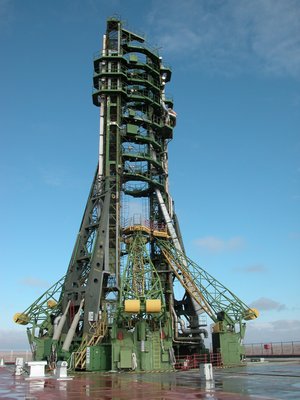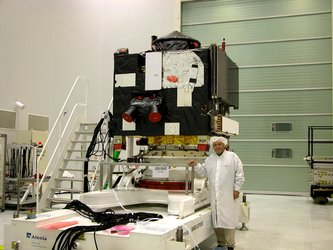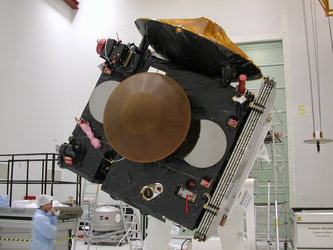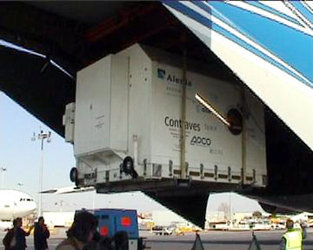"A whole lot of heating going on"
Mars Express launch diary 1
This week Don McCoy, Mars Express Assembly Integration and Verification Engineer, reports on the tests needed to prepare the spacecraft for its journey to Mars.
"What we're mainly busy with this month is the very important Thermal Balance/Thermal Vacuum test. In this test, we subject the satellite to a simulated space vacuum and to extreme hot and cold. The aim is to prove the satellite's ability to withstand the gruelling thermal environment during the mission. The test lasts about 2 weeks. It's quite tough on the teams because they have to work 24 hours a day to ensure the safety of the satellite and to perform the necessary operations.

"As regards the people working here, there's about 50 of us, in various teams. Some do rotating 12-hour shifts, some 8-hour shifts. Maybe you're wondering how I stay awake at the end of such long shifts? I drink lots of coffee and try to stay focused on my work. I have to admit about 4 am, I'm usually quite tired and I need to move in order to stay awake. I think we're all anticipating the end of the test now.
"Of course, we've had some problems, you often do in such complex tests as this. However, in each case, the teams have worked together to resolve them. Presently we're proceeding on schedule. It has been an enormous effort to prepare and conduct the test, and we'll be glad to finish it. However, I think we can be quite proud of how well things have gone.

"After completion of the thermal test, we prepare the spacecraft for vibration testing. We add special instrumentation and complete the building of the satellite by attaching the high-gain antenna, the Beagle 2 lander simulator, and the solar arrays. We'll test the mechanical behaviour of the flight spacecraft. In this way, the vibration tests will verify that the satellite can withstand the hair-raising ride to space on board the Soyuz rocket."















 Germany
Germany
 Austria
Austria
 Belgium
Belgium
 Denmark
Denmark
 Spain
Spain
 Estonia
Estonia
 Finland
Finland
 France
France
 Greece
Greece
 Hungary
Hungary
 Ireland
Ireland
 Italy
Italy
 Luxembourg
Luxembourg
 Norway
Norway
 The Netherlands
The Netherlands
 Poland
Poland
 Portugal
Portugal
 Czechia
Czechia
 Romania
Romania
 United Kingdom
United Kingdom
 Slovenia
Slovenia
 Sweden
Sweden
 Switzerland
Switzerland





































